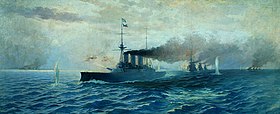| Naval Battle of Elli | |||||||
|---|---|---|---|---|---|---|---|
| Part of First Balkan War | |||||||
 | |||||||
| |||||||
| Belligerents | |||||||
|
|
| ||||||
| Commanders and leaders | |||||||
| Rear Adm Pavlos Kountouriotis | Cpt Ramiz Bey | ||||||
| Strength | |||||||
|
1 armoured cruiser, 3 battleships, 4 destroyers |
1 cruiser, 3 battleships, 3 destroyers | ||||||
| Casualties and losses | |||||||
| 2 dead | heavy damage to the flagship, 58 dead, many wounded | ||||||
The Battle of Elli (also known as the Naval Battle of the Dardanelles, Greek: Ναυμαχία της 'Ελλης) took place on the December 3, 1912 as part of the First Balkan War.
The Royal Hellenic Navy, led by Rear Admiral Pavlos Kountouriotis on board the flagship Averof, defeated the Ottoman Navy, just outside the entrance to the Dardanelles (Hellespont). During the battle, Kountouriotis, frustrated by the slow speed of the three older Greek battleships Hydra, Spetsai and Psara, hoisted the Flag Signal for the letter Z which stood for "Independent Action", and sailed forward alone at a speed of 20 knots, against the Turkish fleet. Taking full advantage in her superior speed, guns and armour, Averof succeeded in crossing the Turkish fleet's "T" and concentrated her fire against the Ottoman flagship, thus forcing the Ottoman fleet to retreat in disorder. The Greek fleet, including the destroyers Aetos, Ierax and Panthir continued to pursue the Turkish fleet off-and-on between the dates of December 13 and December 26, 1912.
This victory was quite significant in that the Turkish navy retreated within the Straits and left the Aegean Sea to the Greeks who were now free to liberate the islands of Lesbos, Chios, Lemnos and Samos.
Through Pope Benedict XV the graves of the dead at Dardanelles were taken care of, photographed, and identified. The Greek cruiser Elli was named for this battle.